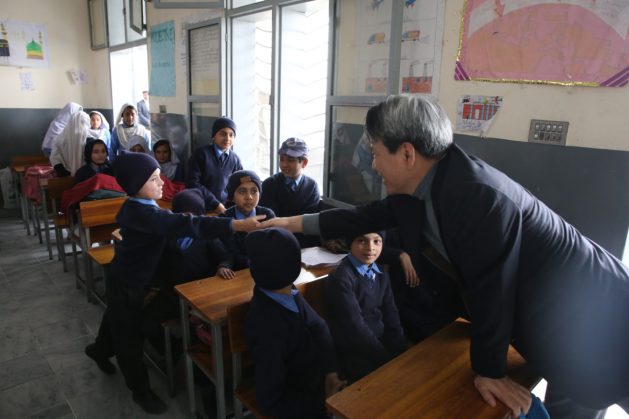PESHAWAR, Oct 12 (IPS) – Amid a looming threat of forceful eviction, Afghan women who arrived in Pakistan after the Taliban’s takeover in Kabul have asked the host country to allow them to stay because they want to continue their education.
On October 4, Pakistan asked more than 1 million undocumented Afghans to leave by November 1 or face deportation or prison. The announcement has caused concern among the thousands of women and girls who arrived after the Taliban took power in Afghanistan in August 2021.
Floods, Now Torrential Monsoon Rains Leave Pakistani Women in Crisis
“We want the Pakistani authorities to show mercy towards women so that they could continue work here because sending them would expose them to brutalities back home,” Mushtari Bibi, 35, who arrived in Peshawar from Nangrahar province in January this year, told IPS.
Bibi is among thousands of women who left her native country after the Taliban banned working women in December 2022.
“I am not only concerned about my life, but my two daughters are studying here in a school because the Taliban has also banned female education,” she said. Bibi said she has also applied for asylum or settlement in a third country, but the process done by the UN agency in partnership with the NGO Society for Human Rights and Prisoners’ Aid (SHARP) is terribly slow.
Bibi stitches clothes and lives with her relatives.
A college student, Noor Mashal, told IPS she would never return to Afghanistan. Mashal, 17, a grade 12 student, left Kabul for Peshawar along with her parents when the Taliban banned women’s education last year.
“The entire world knows the Taliban’s human rights record, especially towards women. In Pakistan, women are doing odd jobs, and girls are studying in schools located in slum areas, which is far better than Afghanistan,” she said.
Pakistan has 2.18 million registered Afghan refugees. Of them, 1.3 million have Proof of Registration (PoR) cards, and 880,000 have Afghan Citizens Cards (ACCs). After the fall of Ashraf Ghani’s government in 2021, an estimated 800,000 came to Pakistan. More than 1 million don’t have valid documents.
Others who fled after the Taliban’s rule are former servicemen, human rights activists, singers, and musicians. Some arrived on valid visas, but mostly crossed into Pakistan without any travel documents.
Qaiser Khan Afridi, spokesperson for UNHCR, told IPS that Pakistan has remained a generous refugee host for decades. “UNHCR acknowledges and appreciates this hospitality and generosity. This role has been acknowledged globally, but more needs to be done to match its generosity by the international community,” Afridi said.
According to the UN refugee agency, any refugee return must be voluntary without any pressure to ensure protection for those seeking safety.
“UNHCR stands ready to support Pakistan in developing a mechanism to manage and register people in need of international protection on its territory and respond to particular vulnerabilities,” Afridi said.
An Afghan student who wished to be identified as Spogmay said Pakistan’s announcement regarding the eviction of refugees has also caused alarm among her classmates.
“My father sold his properties in Herat province at a throwaway price when the Taliban started their anti-women activities. We arrived in Nowshera district near Peshawar and lived with relatives who already lived there,” the 20-year-old student said.
Spogmay was studying computer science at Herat University in Afghanistan. She is now studying in a private academy.
My father has been selling vegetables to survive. “Going back to Afghanistan means sending us to the Stone Age because women have no education and work. What will we do except sit idle at home? We appreciate the hospitality of the host communities and expect the same from the government,” she said.
On October 3, caretaker interior minister Sarfaraz Ahmed Bugti said that since January this year, 24 terrorist attacks have occurred, and Afghan nationals were involved in 14 of these attacks.
More than half of the refugees live in Khyber Pakhtunkhwa (KP), one of Pakistan’s four provinces, close to Afghanistan. Afghan Taliban chief spokesman, Zabihullah Mujahid, said he doubted that the refugees were the cause of Pakistan’s security problems and described Pakistan’s “behaviour” towards Afghan refugees as “unacceptable” and urged Islamabad to reconsider its plan, saying if they were staying there voluntarily, Pakistan should “tolerate them.”
Civil society organisations and analysts want the government to review its decision as the country’s crackdown against illegal refugees is in progress.
Rahim Khan, a Peshawar-based political science teacher, told IPS that the government should deal with the terrorists with an iron hand but spare the women because the situation back home wasn’t worth living.
“It is common knowledge that most women have left Afghanistan because of the Taliban’s hostilities. Repatriating them forcefully or throwing them in jails is an utter violation of human rights,” Khan said.
Human Rights Commission of Pakistan said that refugees’ right to shelter, healthcare and legal counsel must be protected and slammed reports that Afghan refugee settlements were being razed and their occupants summarily evicted.
Maulana Fazlur Rehman, leader of Jamiat Ulemai Islam, a religious-political party, opposed the ongoing drive to repatriate Afghans.
He said even those with the requisite paperwork were being hauled away in an indiscriminate crackdown. “We cannot afford to strain ties with neighbours and a joint Pakistan-Afghanistan commission be formed to resolve the issue,” he said.
In a joint appeal posted on X (formerly Twitter), the UNHCR-IOM asked Pakistan to continue its protection of all vulnerable Afghans who have sought safety in the country and could be at imminent protection risk if forced to return.
IPS UN Bureau Report
Follow @IPSNewsUNBureau
Follow IPS News UN Bureau on Instagram
© Inter Press Service (2023) — All Rights ReservedOriginal source: Inter Press Service
Check out our Latest News and Follow us at Facebook
Original Source

